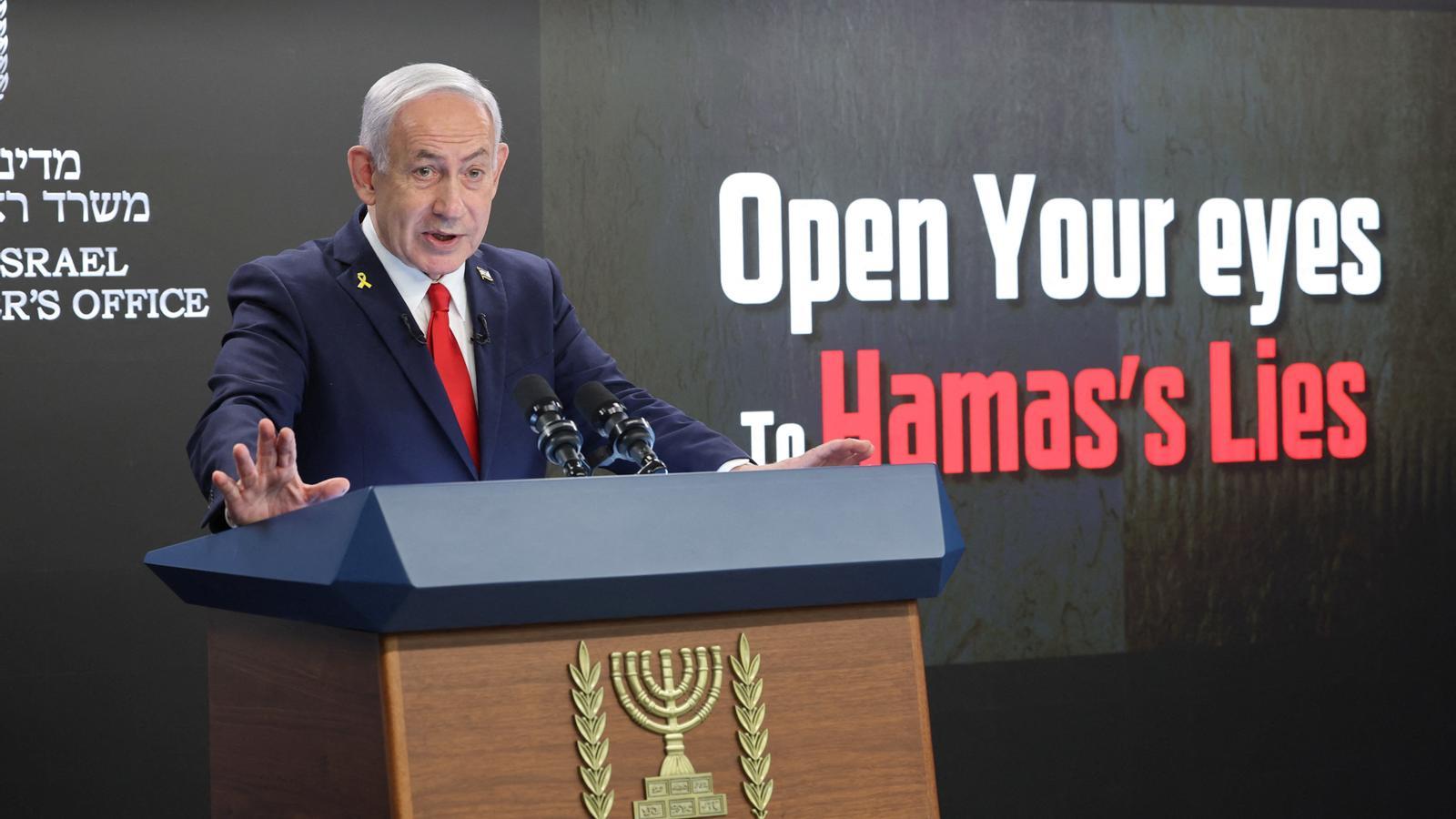Netanyahu blames Hamas for hunger in the Gaza Strip
Israeli Prime Minister insists that "the quickest way to end the war" is to conquer Gaza City

BarcelonaIsraeli Prime Minister Benjamin Netanyahu appeared before the international press on Sunday to defend that Israel has no responsibility in the serious humanitarian crisis in the Gaza Strip, and to insist that Israeli forces will conquer Gaza City despite the barrage of criticism his government has received since Friday, when gave the green light to the military operationThe president has stated that "the only people being deliberately starved are the [Israeli] hostages, not the Palestinian civilians." "Since the beginning of the war, Israel has allowed the entry of nearly two million tons of aid. I don't know of any other army that has allowed so much aid to reach the civilian population in enemy territory. If we had a starvation policy, no one in Gaza would have survived after two years of war," he stressed before a black screen where Hamas lies could be read.
However, Netanyahu has acknowledged that there have been problems at humanitarian aid distribution points run by the Gaza Humanitarian Fund, which is supported by Israel and the United States. But he has attributed them to Hamas. He said the Islamist group has blocked the entry of aid or has outright looted it. "Now we want to increase aid, but if you flood Gaza with food, it will be looted by Hamas," he defended himself.
He also asserted that Hamas militants, not Israeli soldiers, are the ones who often fire on civilians waiting to receive aid. Humanitarian. Just this Saturday, the International Committee of the Red Cross (ICRC) issued a statement saying: "It is unacceptable that people are dying and being injured while trying to feed their families." The ICRC has treated 4,500 people wounded by gunshots since May 27 in Rafah, in the south of the Strip, most of whom were trying to get food.
According to Israel, during the last week a total of 1,900 trucks of humanitarian aid have entered the Gaza Strip, of which 1,300 were carrying food. This means that an average of 270 vehicles have entered each day, a totally insufficient figure according to international organizations such as the UN, which warns that to alleviate the current situation of widespread hunger in the Strip, at least 600 trucks should enter daily.
Regarding the Israeli government's plan to conquer Gaza City, Netanyahu declared: "Contrary to what is being said, this is the best way to end the war and to end it quickly." He also explained that Israel already controls 75% of the Gaza Strip, but that there are two areas where Hamas militants have established a stronghold: the refugee camps in the center and south of the enclave, and Gaza City, where an estimated one million people are concentrated. Therefore, he insisted, it is necessary to "finish the job."
Precisely this Sunday, the United Nations Security Council held an extraordinary meeting, at the request of the United Kingdom, France, Denmark, Greece, and Slovenia, to "condemn the Israeli government's decision to expand military operations in Gaza." According to these countries, "the plan would violate international humanitarian law."
However, Netanyahu turned a deaf ear to the international outcry and shamelessly announced at the press conference that the military operation will begin "very soon." However, to calm tensions, he assured everyone that they will be allowed to "leave the combat zones safely and go to areas designated as safe, where they will be provided with abundant food, water, and medical care." But given what has happened in recent months and continues to happen today—areas declared safe for civilians are being bombed by Israel—his words generate skepticism.
The prime minister also insisted that conquering Gaza City is the only way to secure the release of the Israeli hostages still held captive. He clarified that Israel's goal is not to occupy the Strip, but to liberate it from "Hamas terrorists." Once they have done so, he went on to explain, "Gaza will be demilitarized, Israel will have primary responsibility for security, a security zone will be established on the border with Israel to prevent future terrorist incursions, and a civil administration will be established." He did not specify who will lead this civil administration, but assured that it will not be Israel.
International press ban
On the other hand, when journalists questioned Netanyahu about not allowing the international press into Gaza, he said, "Two days ago I gave instructions that access be allowed." But he also insisted on the importance of ensuring the safety of reporters.
Since Friday, several world leaders have criticized the Israeli government's decision to conquer Gaza City. Germany, Israel's main European ally, even announced, in the wake of this decision, that it was suspending arms exports to the country. On Saturday, Tel Aviv was the scene of one of the largest demonstrations in recent months in Israel: one hundred thousand people took to the streets to demand the return of the hostages and an end to the war.
